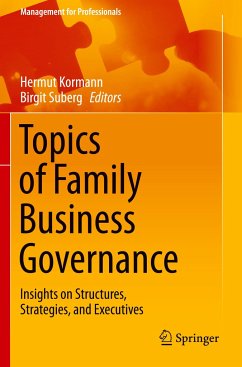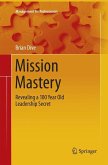Topics of Family Business Governance
Insights on Structures, Strategies, and Executives
Herausgegeben:Kormann, Hermut; Suberg, Birgit
Topics of Family Business Governance
Insights on Structures, Strategies, and Executives
Herausgegeben:Kormann, Hermut; Suberg, Birgit
- Broschiertes Buch
- Merkliste
- Auf die Merkliste
- Bewerten Bewerten
- Teilen
- Produkt teilen
- Produkterinnerung
- Produkterinnerung
This book focuses on the role of the board in family businesses and specifically on processes and topics of strategic importance. It comprises all the relevant topics which need to be addressed on a regular basis such as strategy development, financial management, and leadership. The pros and cons of each issue are elaborated. This is one of the few books which addresses family businesses from governance systems to the role of executives. The diverse set of examples carefully collected by the authors and an in-depth discussion on the topics provide readers with valuable insights to broaden and enrich the effectiveness of governance.…mehr
Andere Kunden interessierten sich auch für
![Topics of Family Business Governance Topics of Family Business Governance]() Topics of Family Business Governance50,99 €
Topics of Family Business Governance50,99 €![Corporate Governance and Firm Value in Italy Corporate Governance and Firm Value in Italy]() Bruno BuchettiCorporate Governance and Firm Value in Italy106,99 €
Bruno BuchettiCorporate Governance and Firm Value in Italy106,99 €![Corporate Governance and Firm Value in Italy Corporate Governance and Firm Value in Italy]() Bruno BuchettiCorporate Governance and Firm Value in Italy77,99 €
Bruno BuchettiCorporate Governance and Firm Value in Italy77,99 €![Enterprise Governance of Information Technology Enterprise Governance of Information Technology]() Steven De HaesEnterprise Governance of Information Technology54,99 €
Steven De HaesEnterprise Governance of Information Technology54,99 €![Mission Mastery Mission Mastery]() Brian DiveMission Mastery39,99 €
Brian DiveMission Mastery39,99 €![Enterprise Governance of Information Technology Enterprise Governance of Information Technology]() Steven De HaesEnterprise Governance of Information Technology47,99 €
Steven De HaesEnterprise Governance of Information Technology47,99 €![TOPICS ON PUBLIC SAFETY IN THE STATE OF MEXICO TOPICS ON PUBLIC SAFETY IN THE STATE OF MEXICO]() Moisés Elizarrarás HernándezTOPICS ON PUBLIC SAFETY IN THE STATE OF MEXICO30,99 €
Moisés Elizarrarás HernándezTOPICS ON PUBLIC SAFETY IN THE STATE OF MEXICO30,99 €-
-
-
This book focuses on the role of the board in family businesses and specifically on processes and topics of strategic importance. It comprises all the relevant topics which need to be addressed on a regular basis such as strategy development, financial management, and leadership. The pros and cons of each issue are elaborated. This is one of the few books which addresses family businesses from governance systems to the role of executives. The diverse set of examples carefully collected by the authors and an in-depth discussion on the topics provide readers with valuable insights to broaden and enrich the effectiveness of governance.
Produktdetails
- Produktdetails
- Management for Professionals
- Verlag: Springer / Springer International Publishing / Springer, Berlin
- Artikelnr. des Verlages: 978-3-030-58021-6
- 1st edition 2021
- Seitenzahl: 172
- Erscheinungstermin: 19. November 2021
- Englisch
- Abmessung: 235mm x 155mm x 10mm
- Gewicht: 271g
- ISBN-13: 9783030580216
- ISBN-10: 3030580210
- Artikelnr.: 62805579
- Herstellerkennzeichnung Die Herstellerinformationen sind derzeit nicht verfügbar.
- Management for Professionals
- Verlag: Springer / Springer International Publishing / Springer, Berlin
- Artikelnr. des Verlages: 978-3-030-58021-6
- 1st edition 2021
- Seitenzahl: 172
- Erscheinungstermin: 19. November 2021
- Englisch
- Abmessung: 235mm x 155mm x 10mm
- Gewicht: 271g
- ISBN-13: 9783030580216
- ISBN-10: 3030580210
- Artikelnr.: 62805579
- Herstellerkennzeichnung Die Herstellerinformationen sind derzeit nicht verfügbar.
Hermut Kormann served as CFO (1989-99) and CEO (2000-08) of Voith, a 150-year-old German family enterprise. Prior to Voith, he held positions at Brown, Boveri & Cie. (currently called ABB) and Booz & Co., management consultants. Dr. Kormann has served on various supervisory boards of family enterprises. He advises owning families on issues of owner strategy. Dr. Kormann is a Visiting Professor at Leipzig University (Germany) and Professor at Zeppelin University (Germany) where he lectures on leadership, strategy, and governance in family-owned businesses. Birgit Suberg is an Associate Professor of Practice at Xi'an Jiaotong-Liverpool University in Suzhou (China). She is also the Managing Director of a Shanghai-based consulting company. After starting out in strategic consulting and project management in Germany, she has worked in China in several leading positions for multinational and Chinese family and founder-controlled firms.
The design of boards for comprehensive tasks and efficient processes.- Introduction.- Exploring the topics of governance.- Modules and tasks of governance.- One-tier and two-tier boards.- Design parameters of a board for family enterprises.- Governance for the lone founder.- Agenda setting:Clarifying the strategic situation and the challenges.- Monitoring: We need meaningful data.- The difficult task of advising.- To create a sense of urgency.- The board's key role during a crisis - such as COVID-19.- The board's discussions on topics of family enterprises' strategies.- The key issues of the family enterprise's strategy.- Profits as the basis of strategy.- Investments strategy for stability and development.- Innovation strategy for renewal and growth.- Patterns of family enterprise's growth.- Avoiding unacceptable risks.- Compliance and environmental protection: CSR in family enterprises.- Recession management for coping with economic cycles.- Fighting financial squeeze.- The trade-offs of mergers & acquisitions.- The trade-offs of going public of family enterprises.- Profit distribution policy in family enterprises.- The development of professional owners and capable executives in family enterprises.- Developing responsible owners in family business.- Development of executives in family enterprises.- Challenges and benefits of sibling-consortium in management of family enterprises.- Preparation for succession in family enterprises.- The challenges and benefits of non-family-management in family enterprises.- Professional executive search for family enterprises.- The trade-offs of incentive programs in family enterprises.- The family is the destiny of the enterprise.
The design of boards for comprehensive tasks and efficient processes.- Introduction.- Exploring the topics of governance.- Modules and tasks of governance.- One-tier and two-tier boards.- Design parameters of a board for family enterprises.- Governance for the lone founder.- Agenda setting:Clarifying the strategic situation and the challenges.- Monitoring: We need meaningful data.- The difficult task of advising.- To create a sense of urgency.- The board's key role during a crisis - such as COVID-19.- The board's discussions on topics of family enterprises' strategies.- The key issues of the family enterprise's strategy.- Profits as the basis of strategy.- Investments strategy for stability and development.- Innovation strategy for renewal and growth.- Patterns of family enterprise's growth.- Avoiding unacceptable risks.- Compliance and environmental protection: CSR in family enterprises.- Recession management for coping with economic cycles.- Fighting financial squeeze.- The trade-offs of mergers & acquisitions.- The trade-offs of going public of family enterprises.- Profit distribution policy in family enterprises.- The development of professional owners and capable executives in family enterprises.- Developing responsible owners in family business.- Development of executives in family enterprises.- Challenges and benefits of sibling-consortium in management of family enterprises.- Preparation for succession in family enterprises.- The challenges and benefits of non-family-management in family enterprises.- Professional executive search for family enterprises.- The trade-offs of incentive programs in family enterprises.- The family is the destiny of the enterprise.








